Existentialism: A Comparison of Sartre, Camus, and Nietzsche
VerifiedAdded on 2020/05/28
|9
|2336
|216
Essay
AI Summary
This essay delves into the core tenets of existentialism, examining the philosophical viewpoints of Jean-Paul Sartre, Albert Camus, and Friedrich Nietzsche. It explores their diverse perspectives on the meaning of life, the nature of human existence, and the significance of individual choices in a world often perceived as absurd. The essay highlights Nietzsche's concept of self-overcoming and the Übermensch, Sartre's emphasis on the primacy of existence over essence and the freedom of choice, and Camus's exploration of the absurd and the individual's response to it. It contrasts essentialism and existentialism, explaining how existentialists question the inherent purpose of human life and emphasize the importance of self-created meaning. The essay also touches upon related concepts such as nihilism and the impact of societal norms on individual authenticity, offering a comparative analysis of these three influential philosophers and their contributions to existential thought.
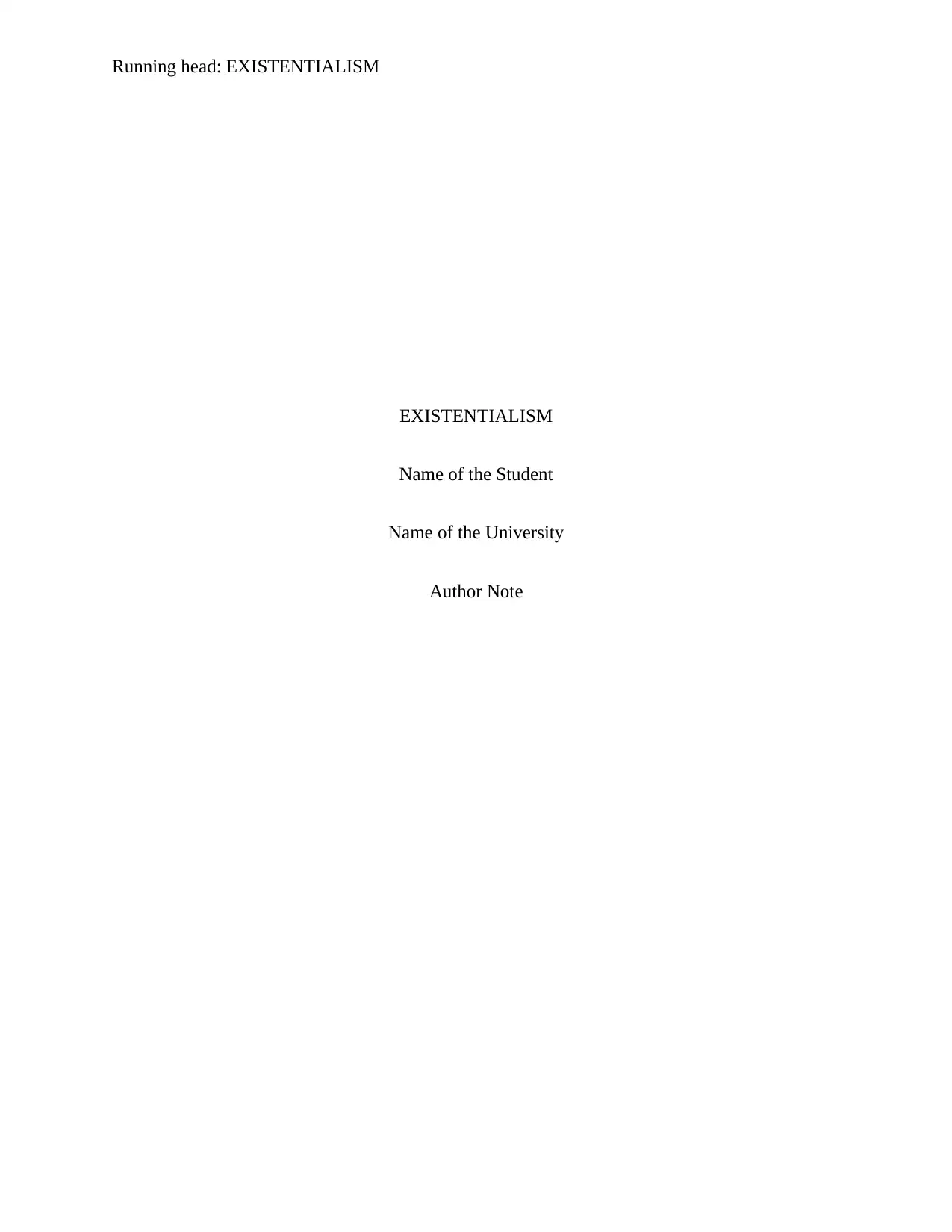
Running head: EXISTENTIALISM
EXISTENTIALISM
Name of the Student
Name of the University
Author Note
EXISTENTIALISM
Name of the Student
Name of the University
Author Note
Paraphrase This Document
Need a fresh take? Get an instant paraphrase of this document with our AI Paraphraser
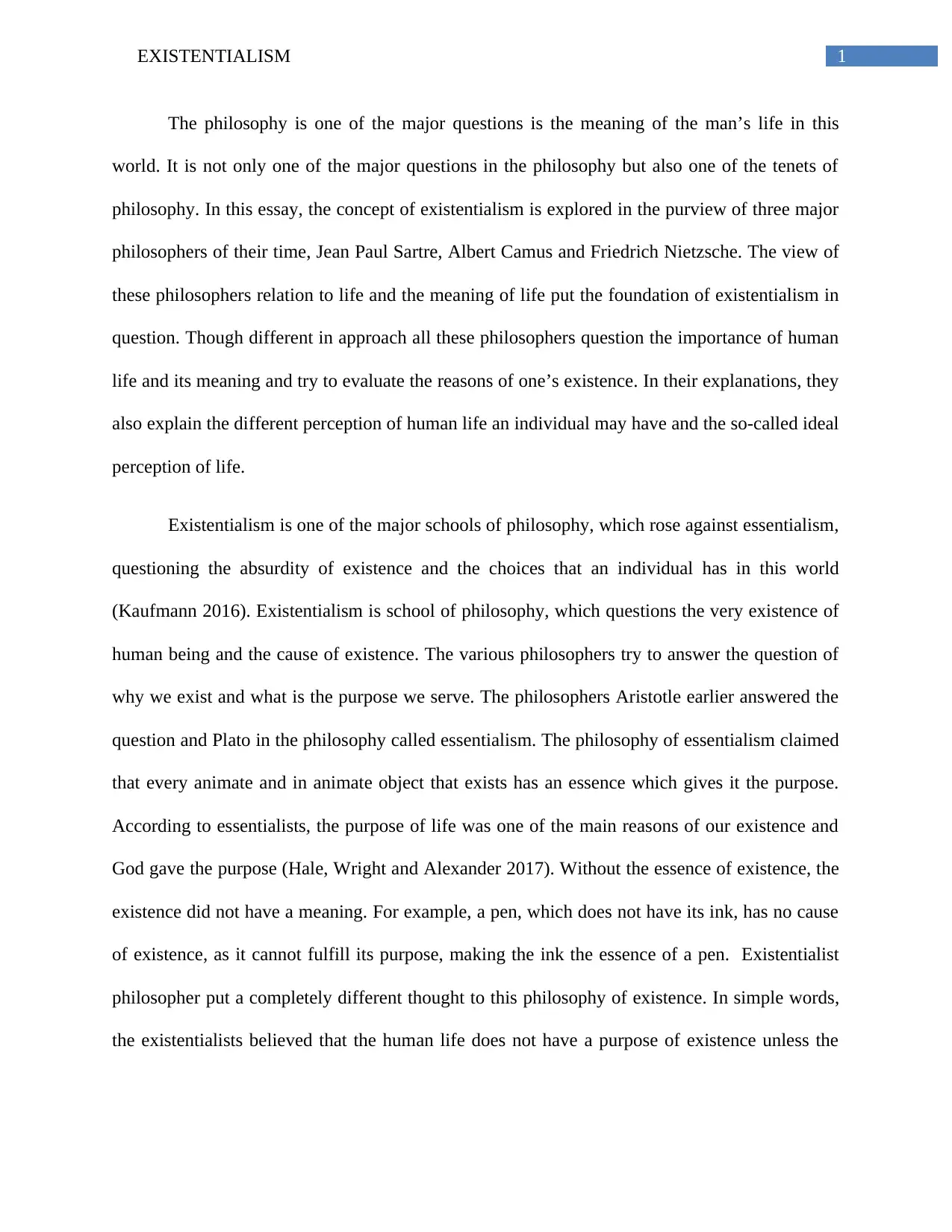
1EXISTENTIALISM
The philosophy is one of the major questions is the meaning of the man’s life in this
world. It is not only one of the major questions in the philosophy but also one of the tenets of
philosophy. In this essay, the concept of existentialism is explored in the purview of three major
philosophers of their time, Jean Paul Sartre, Albert Camus and Friedrich Nietzsche. The view of
these philosophers relation to life and the meaning of life put the foundation of existentialism in
question. Though different in approach all these philosophers question the importance of human
life and its meaning and try to evaluate the reasons of one’s existence. In their explanations, they
also explain the different perception of human life an individual may have and the so-called ideal
perception of life.
Existentialism is one of the major schools of philosophy, which rose against essentialism,
questioning the absurdity of existence and the choices that an individual has in this world
(Kaufmann 2016). Existentialism is school of philosophy, which questions the very existence of
human being and the cause of existence. The various philosophers try to answer the question of
why we exist and what is the purpose we serve. The philosophers Aristotle earlier answered the
question and Plato in the philosophy called essentialism. The philosophy of essentialism claimed
that every animate and in animate object that exists has an essence which gives it the purpose.
According to essentialists, the purpose of life was one of the main reasons of our existence and
God gave the purpose (Hale, Wright and Alexander 2017). Without the essence of existence, the
existence did not have a meaning. For example, a pen, which does not have its ink, has no cause
of existence, as it cannot fulfill its purpose, making the ink the essence of a pen. Existentialist
philosopher put a completely different thought to this philosophy of existence. In simple words,
the existentialists believed that the human life does not have a purpose of existence unless the
The philosophy is one of the major questions is the meaning of the man’s life in this
world. It is not only one of the major questions in the philosophy but also one of the tenets of
philosophy. In this essay, the concept of existentialism is explored in the purview of three major
philosophers of their time, Jean Paul Sartre, Albert Camus and Friedrich Nietzsche. The view of
these philosophers relation to life and the meaning of life put the foundation of existentialism in
question. Though different in approach all these philosophers question the importance of human
life and its meaning and try to evaluate the reasons of one’s existence. In their explanations, they
also explain the different perception of human life an individual may have and the so-called ideal
perception of life.
Existentialism is one of the major schools of philosophy, which rose against essentialism,
questioning the absurdity of existence and the choices that an individual has in this world
(Kaufmann 2016). Existentialism is school of philosophy, which questions the very existence of
human being and the cause of existence. The various philosophers try to answer the question of
why we exist and what is the purpose we serve. The philosophers Aristotle earlier answered the
question and Plato in the philosophy called essentialism. The philosophy of essentialism claimed
that every animate and in animate object that exists has an essence which gives it the purpose.
According to essentialists, the purpose of life was one of the main reasons of our existence and
God gave the purpose (Hale, Wright and Alexander 2017). Without the essence of existence, the
existence did not have a meaning. For example, a pen, which does not have its ink, has no cause
of existence, as it cannot fulfill its purpose, making the ink the essence of a pen. Existentialist
philosopher put a completely different thought to this philosophy of existence. In simple words,
the existentialists believed that the human life does not have a purpose of existence unless the
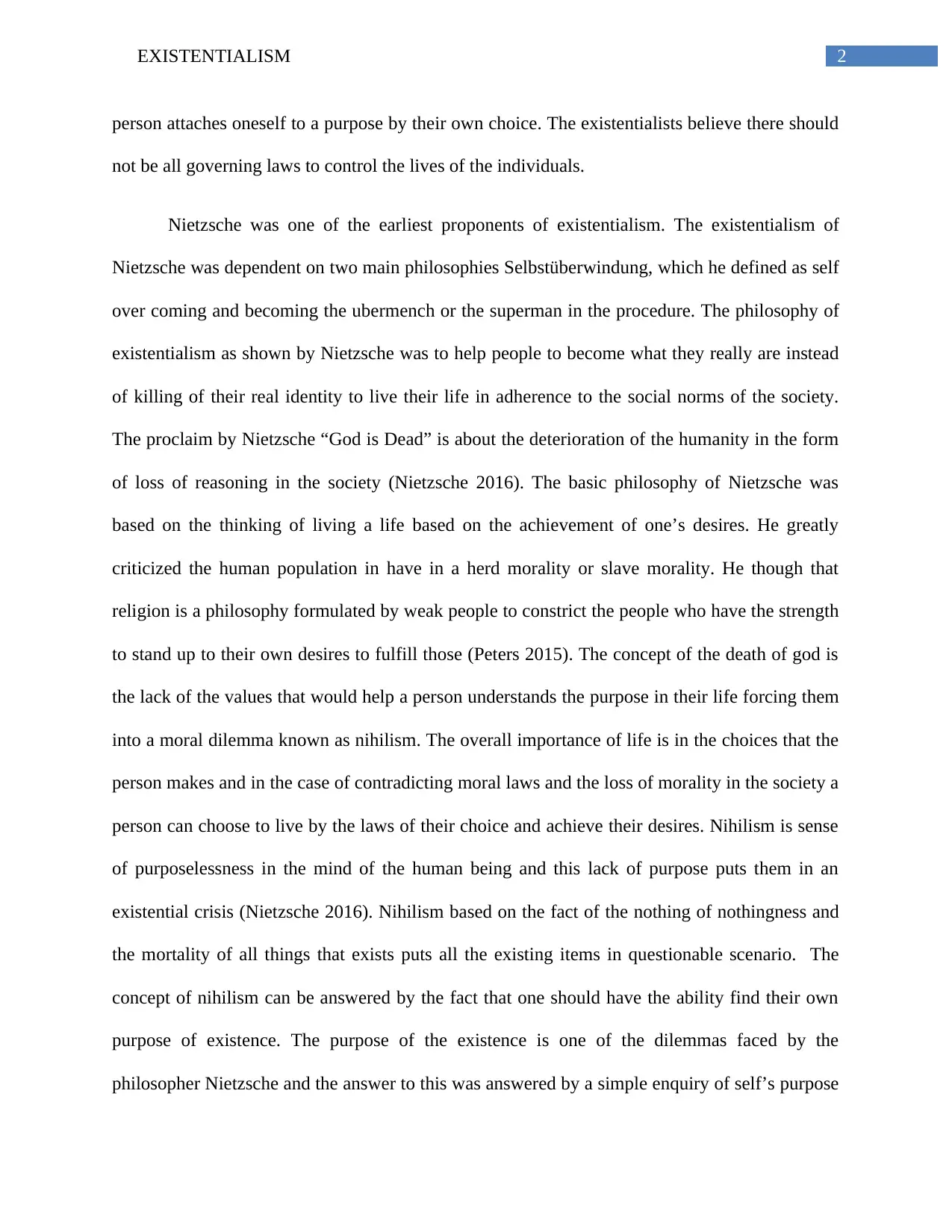
2EXISTENTIALISM
person attaches oneself to a purpose by their own choice. The existentialists believe there should
not be all governing laws to control the lives of the individuals.
Nietzsche was one of the earliest proponents of existentialism. The existentialism of
Nietzsche was dependent on two main philosophies Selbstüberwindung, which he defined as self
over coming and becoming the ubermench or the superman in the procedure. The philosophy of
existentialism as shown by Nietzsche was to help people to become what they really are instead
of killing of their real identity to live their life in adherence to the social norms of the society.
The proclaim by Nietzsche “God is Dead” is about the deterioration of the humanity in the form
of loss of reasoning in the society (Nietzsche 2016). The basic philosophy of Nietzsche was
based on the thinking of living a life based on the achievement of one’s desires. He greatly
criticized the human population in have in a herd morality or slave morality. He though that
religion is a philosophy formulated by weak people to constrict the people who have the strength
to stand up to their own desires to fulfill those (Peters 2015). The concept of the death of god is
the lack of the values that would help a person understands the purpose in their life forcing them
into a moral dilemma known as nihilism. The overall importance of life is in the choices that the
person makes and in the case of contradicting moral laws and the loss of morality in the society a
person can choose to live by the laws of their choice and achieve their desires. Nihilism is sense
of purposelessness in the mind of the human being and this lack of purpose puts them in an
existential crisis (Nietzsche 2016). Nihilism based on the fact of the nothing of nothingness and
the mortality of all things that exists puts all the existing items in questionable scenario. The
concept of nihilism can be answered by the fact that one should have the ability find their own
purpose of existence. The purpose of the existence is one of the dilemmas faced by the
philosopher Nietzsche and the answer to this was answered by a simple enquiry of self’s purpose
person attaches oneself to a purpose by their own choice. The existentialists believe there should
not be all governing laws to control the lives of the individuals.
Nietzsche was one of the earliest proponents of existentialism. The existentialism of
Nietzsche was dependent on two main philosophies Selbstüberwindung, which he defined as self
over coming and becoming the ubermench or the superman in the procedure. The philosophy of
existentialism as shown by Nietzsche was to help people to become what they really are instead
of killing of their real identity to live their life in adherence to the social norms of the society.
The proclaim by Nietzsche “God is Dead” is about the deterioration of the humanity in the form
of loss of reasoning in the society (Nietzsche 2016). The basic philosophy of Nietzsche was
based on the thinking of living a life based on the achievement of one’s desires. He greatly
criticized the human population in have in a herd morality or slave morality. He though that
religion is a philosophy formulated by weak people to constrict the people who have the strength
to stand up to their own desires to fulfill those (Peters 2015). The concept of the death of god is
the lack of the values that would help a person understands the purpose in their life forcing them
into a moral dilemma known as nihilism. The overall importance of life is in the choices that the
person makes and in the case of contradicting moral laws and the loss of morality in the society a
person can choose to live by the laws of their choice and achieve their desires. Nihilism is sense
of purposelessness in the mind of the human being and this lack of purpose puts them in an
existential crisis (Nietzsche 2016). Nihilism based on the fact of the nothing of nothingness and
the mortality of all things that exists puts all the existing items in questionable scenario. The
concept of nihilism can be answered by the fact that one should have the ability find their own
purpose of existence. The purpose of the existence is one of the dilemmas faced by the
philosopher Nietzsche and the answer to this was answered by a simple enquiry of self’s purpose
⊘ This is a preview!⊘
Do you want full access?
Subscribe today to unlock all pages.

Trusted by 1+ million students worldwide
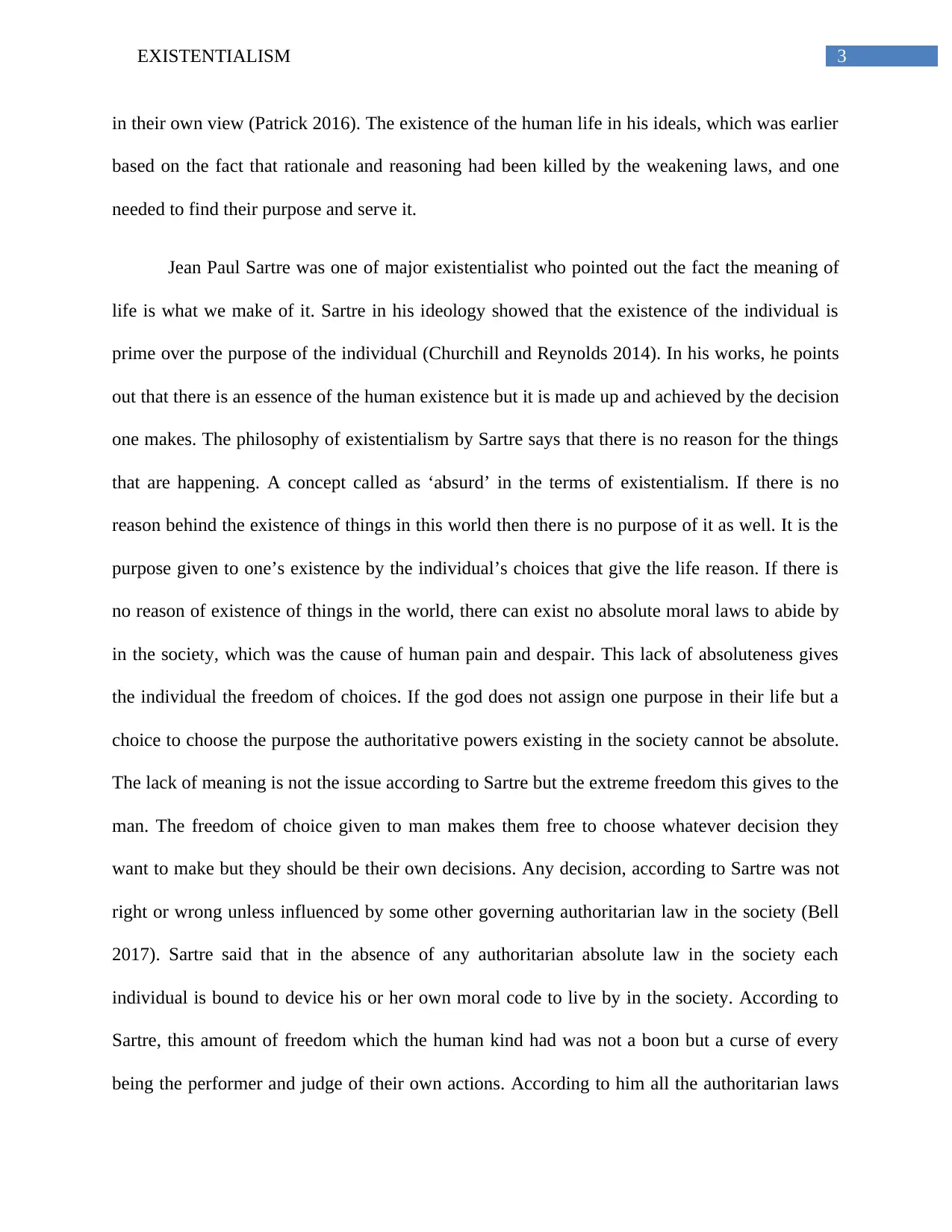
3EXISTENTIALISM
in their own view (Patrick 2016). The existence of the human life in his ideals, which was earlier
based on the fact that rationale and reasoning had been killed by the weakening laws, and one
needed to find their purpose and serve it.
Jean Paul Sartre was one of major existentialist who pointed out the fact the meaning of
life is what we make of it. Sartre in his ideology showed that the existence of the individual is
prime over the purpose of the individual (Churchill and Reynolds 2014). In his works, he points
out that there is an essence of the human existence but it is made up and achieved by the decision
one makes. The philosophy of existentialism by Sartre says that there is no reason for the things
that are happening. A concept called as ‘absurd’ in the terms of existentialism. If there is no
reason behind the existence of things in this world then there is no purpose of it as well. It is the
purpose given to one’s existence by the individual’s choices that give the life reason. If there is
no reason of existence of things in the world, there can exist no absolute moral laws to abide by
in the society, which was the cause of human pain and despair. This lack of absoluteness gives
the individual the freedom of choices. If the god does not assign one purpose in their life but a
choice to choose the purpose the authoritative powers existing in the society cannot be absolute.
The lack of meaning is not the issue according to Sartre but the extreme freedom this gives to the
man. The freedom of choice given to man makes them free to choose whatever decision they
want to make but they should be their own decisions. Any decision, according to Sartre was not
right or wrong unless influenced by some other governing authoritarian law in the society (Bell
2017). Sartre said that in the absence of any authoritarian absolute law in the society each
individual is bound to device his or her own moral code to live by in the society. According to
Sartre, this amount of freedom which the human kind had was not a boon but a curse of every
being the performer and judge of their own actions. According to him all the authoritarian laws
in their own view (Patrick 2016). The existence of the human life in his ideals, which was earlier
based on the fact that rationale and reasoning had been killed by the weakening laws, and one
needed to find their purpose and serve it.
Jean Paul Sartre was one of major existentialist who pointed out the fact the meaning of
life is what we make of it. Sartre in his ideology showed that the existence of the individual is
prime over the purpose of the individual (Churchill and Reynolds 2014). In his works, he points
out that there is an essence of the human existence but it is made up and achieved by the decision
one makes. The philosophy of existentialism by Sartre says that there is no reason for the things
that are happening. A concept called as ‘absurd’ in the terms of existentialism. If there is no
reason behind the existence of things in this world then there is no purpose of it as well. It is the
purpose given to one’s existence by the individual’s choices that give the life reason. If there is
no reason of existence of things in the world, there can exist no absolute moral laws to abide by
in the society, which was the cause of human pain and despair. This lack of absoluteness gives
the individual the freedom of choices. If the god does not assign one purpose in their life but a
choice to choose the purpose the authoritative powers existing in the society cannot be absolute.
The lack of meaning is not the issue according to Sartre but the extreme freedom this gives to the
man. The freedom of choice given to man makes them free to choose whatever decision they
want to make but they should be their own decisions. Any decision, according to Sartre was not
right or wrong unless influenced by some other governing authoritarian law in the society (Bell
2017). Sartre said that in the absence of any authoritarian absolute law in the society each
individual is bound to device his or her own moral code to live by in the society. According to
Sartre, this amount of freedom which the human kind had was not a boon but a curse of every
being the performer and judge of their own actions. According to him all the authoritarian laws
Paraphrase This Document
Need a fresh take? Get an instant paraphrase of this document with our AI Paraphraser
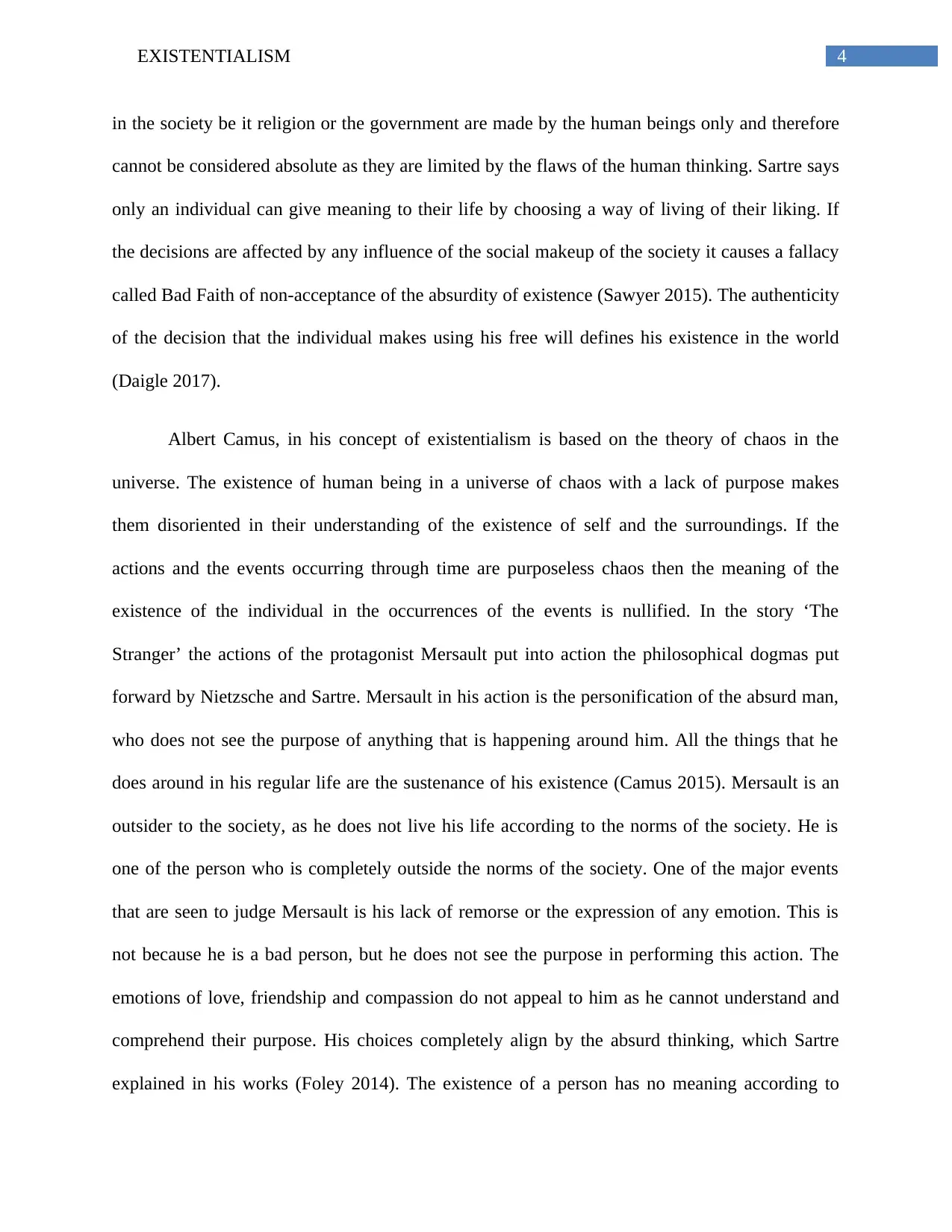
4EXISTENTIALISM
in the society be it religion or the government are made by the human beings only and therefore
cannot be considered absolute as they are limited by the flaws of the human thinking. Sartre says
only an individual can give meaning to their life by choosing a way of living of their liking. If
the decisions are affected by any influence of the social makeup of the society it causes a fallacy
called Bad Faith of non-acceptance of the absurdity of existence (Sawyer 2015). The authenticity
of the decision that the individual makes using his free will defines his existence in the world
(Daigle 2017).
Albert Camus, in his concept of existentialism is based on the theory of chaos in the
universe. The existence of human being in a universe of chaos with a lack of purpose makes
them disoriented in their understanding of the existence of self and the surroundings. If the
actions and the events occurring through time are purposeless chaos then the meaning of the
existence of the individual in the occurrences of the events is nullified. In the story ‘The
Stranger’ the actions of the protagonist Mersault put into action the philosophical dogmas put
forward by Nietzsche and Sartre. Mersault in his action is the personification of the absurd man,
who does not see the purpose of anything that is happening around him. All the things that he
does around in his regular life are the sustenance of his existence (Camus 2015). Mersault is an
outsider to the society, as he does not live his life according to the norms of the society. He is
one of the person who is completely outside the norms of the society. One of the major events
that are seen to judge Mersault is his lack of remorse or the expression of any emotion. This is
not because he is a bad person, but he does not see the purpose in performing this action. The
emotions of love, friendship and compassion do not appeal to him as he cannot understand and
comprehend their purpose. His choices completely align by the absurd thinking, which Sartre
explained in his works (Foley 2014). The existence of a person has no meaning according to
in the society be it religion or the government are made by the human beings only and therefore
cannot be considered absolute as they are limited by the flaws of the human thinking. Sartre says
only an individual can give meaning to their life by choosing a way of living of their liking. If
the decisions are affected by any influence of the social makeup of the society it causes a fallacy
called Bad Faith of non-acceptance of the absurdity of existence (Sawyer 2015). The authenticity
of the decision that the individual makes using his free will defines his existence in the world
(Daigle 2017).
Albert Camus, in his concept of existentialism is based on the theory of chaos in the
universe. The existence of human being in a universe of chaos with a lack of purpose makes
them disoriented in their understanding of the existence of self and the surroundings. If the
actions and the events occurring through time are purposeless chaos then the meaning of the
existence of the individual in the occurrences of the events is nullified. In the story ‘The
Stranger’ the actions of the protagonist Mersault put into action the philosophical dogmas put
forward by Nietzsche and Sartre. Mersault in his action is the personification of the absurd man,
who does not see the purpose of anything that is happening around him. All the things that he
does around in his regular life are the sustenance of his existence (Camus 2015). Mersault is an
outsider to the society, as he does not live his life according to the norms of the society. He is
one of the person who is completely outside the norms of the society. One of the major events
that are seen to judge Mersault is his lack of remorse or the expression of any emotion. This is
not because he is a bad person, but he does not see the purpose in performing this action. The
emotions of love, friendship and compassion do not appeal to him as he cannot understand and
comprehend their purpose. His choices completely align by the absurd thinking, which Sartre
explained in his works (Foley 2014). The existence of a person has no meaning according to
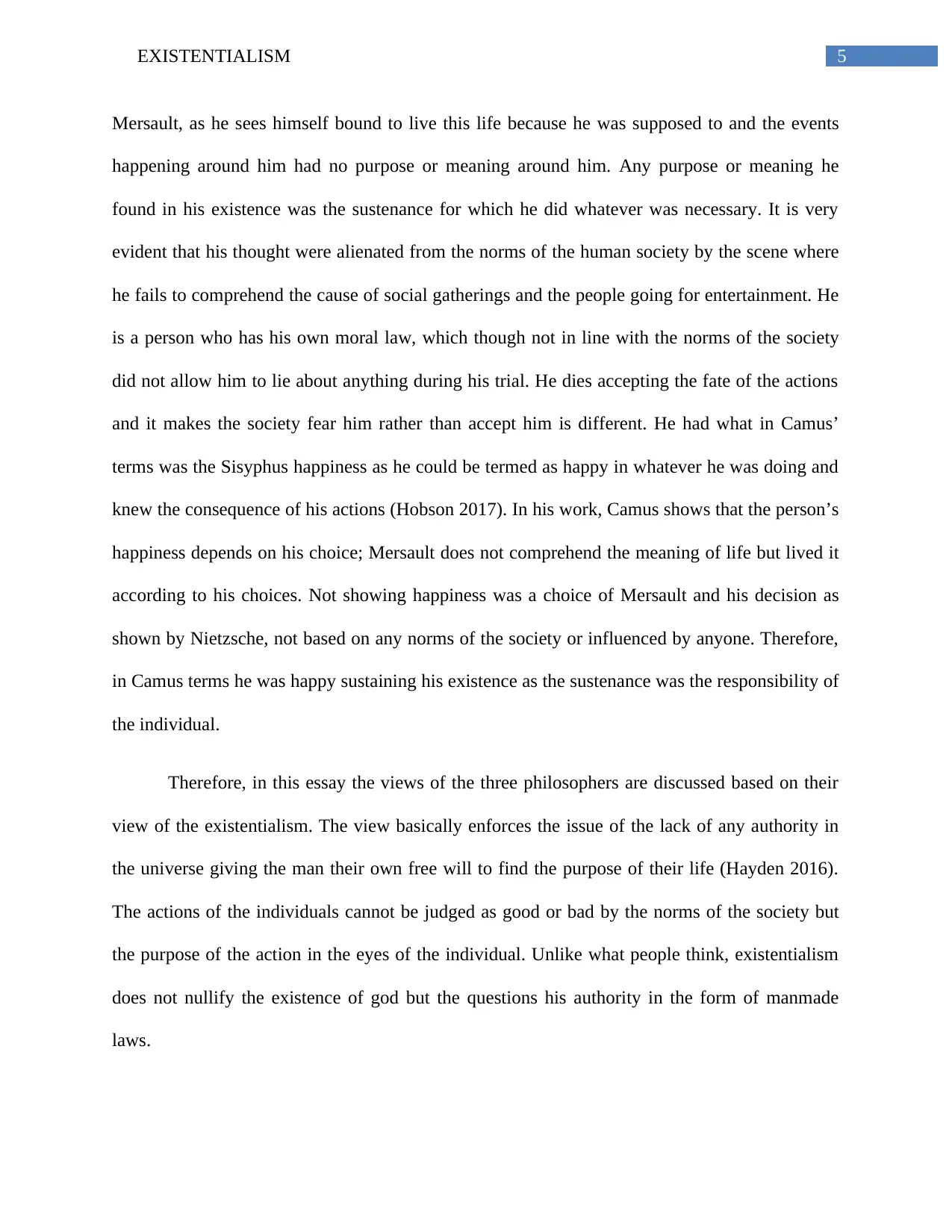
5EXISTENTIALISM
Mersault, as he sees himself bound to live this life because he was supposed to and the events
happening around him had no purpose or meaning around him. Any purpose or meaning he
found in his existence was the sustenance for which he did whatever was necessary. It is very
evident that his thought were alienated from the norms of the human society by the scene where
he fails to comprehend the cause of social gatherings and the people going for entertainment. He
is a person who has his own moral law, which though not in line with the norms of the society
did not allow him to lie about anything during his trial. He dies accepting the fate of the actions
and it makes the society fear him rather than accept him is different. He had what in Camus’
terms was the Sisyphus happiness as he could be termed as happy in whatever he was doing and
knew the consequence of his actions (Hobson 2017). In his work, Camus shows that the person’s
happiness depends on his choice; Mersault does not comprehend the meaning of life but lived it
according to his choices. Not showing happiness was a choice of Mersault and his decision as
shown by Nietzsche, not based on any norms of the society or influenced by anyone. Therefore,
in Camus terms he was happy sustaining his existence as the sustenance was the responsibility of
the individual.
Therefore, in this essay the views of the three philosophers are discussed based on their
view of the existentialism. The view basically enforces the issue of the lack of any authority in
the universe giving the man their own free will to find the purpose of their life (Hayden 2016).
The actions of the individuals cannot be judged as good or bad by the norms of the society but
the purpose of the action in the eyes of the individual. Unlike what people think, existentialism
does not nullify the existence of god but the questions his authority in the form of manmade
laws.
Mersault, as he sees himself bound to live this life because he was supposed to and the events
happening around him had no purpose or meaning around him. Any purpose or meaning he
found in his existence was the sustenance for which he did whatever was necessary. It is very
evident that his thought were alienated from the norms of the human society by the scene where
he fails to comprehend the cause of social gatherings and the people going for entertainment. He
is a person who has his own moral law, which though not in line with the norms of the society
did not allow him to lie about anything during his trial. He dies accepting the fate of the actions
and it makes the society fear him rather than accept him is different. He had what in Camus’
terms was the Sisyphus happiness as he could be termed as happy in whatever he was doing and
knew the consequence of his actions (Hobson 2017). In his work, Camus shows that the person’s
happiness depends on his choice; Mersault does not comprehend the meaning of life but lived it
according to his choices. Not showing happiness was a choice of Mersault and his decision as
shown by Nietzsche, not based on any norms of the society or influenced by anyone. Therefore,
in Camus terms he was happy sustaining his existence as the sustenance was the responsibility of
the individual.
Therefore, in this essay the views of the three philosophers are discussed based on their
view of the existentialism. The view basically enforces the issue of the lack of any authority in
the universe giving the man their own free will to find the purpose of their life (Hayden 2016).
The actions of the individuals cannot be judged as good or bad by the norms of the society but
the purpose of the action in the eyes of the individual. Unlike what people think, existentialism
does not nullify the existence of god but the questions his authority in the form of manmade
laws.
⊘ This is a preview!⊘
Do you want full access?
Subscribe today to unlock all pages.

Trusted by 1+ million students worldwide
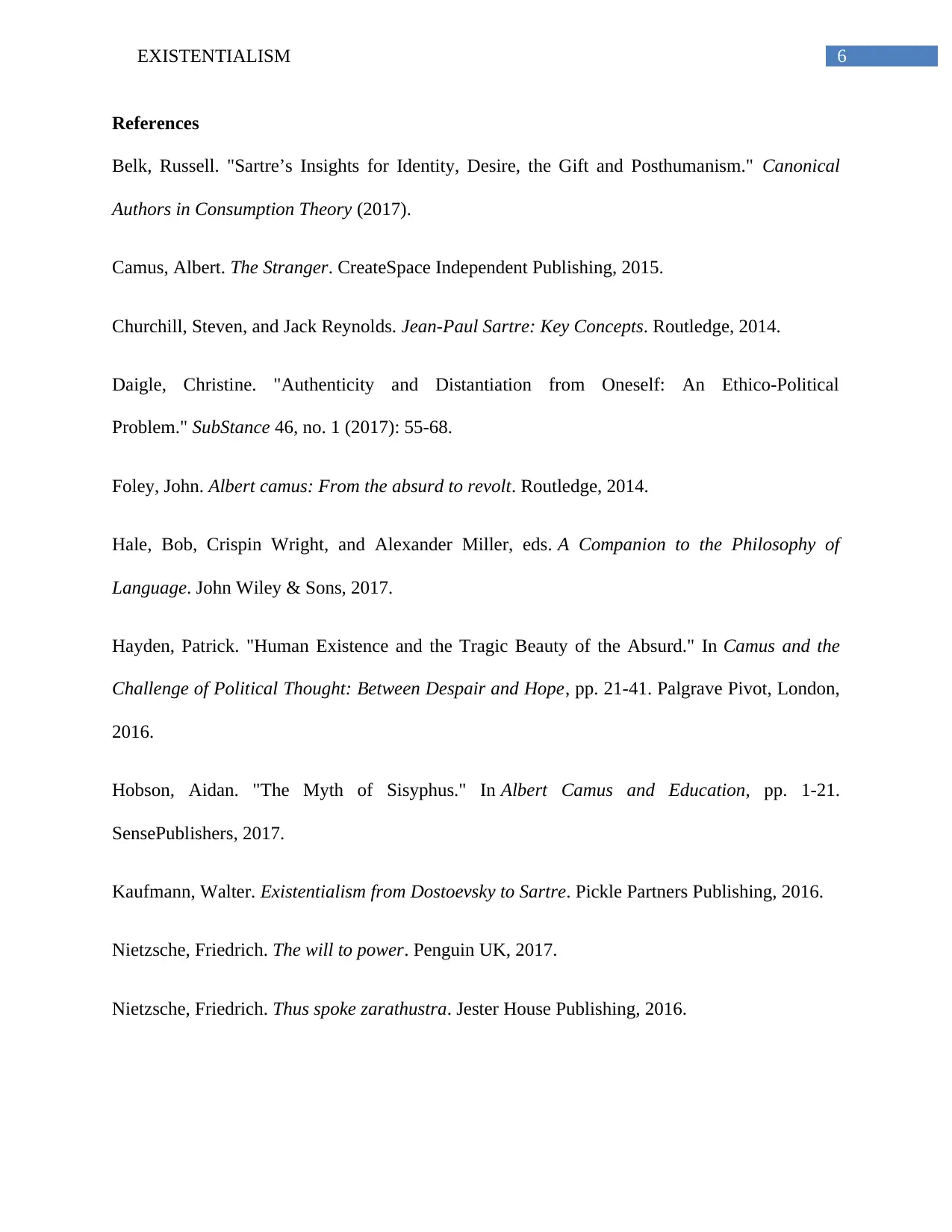
6EXISTENTIALISM
References
Belk, Russell. "Sartre’s Insights for Identity, Desire, the Gift and Posthumanism." Canonical
Authors in Consumption Theory (2017).
Camus, Albert. The Stranger. CreateSpace Independent Publishing, 2015.
Churchill, Steven, and Jack Reynolds. Jean-Paul Sartre: Key Concepts. Routledge, 2014.
Daigle, Christine. "Authenticity and Distantiation from Oneself: An Ethico-Political
Problem." SubStance 46, no. 1 (2017): 55-68.
Foley, John. Albert camus: From the absurd to revolt. Routledge, 2014.
Hale, Bob, Crispin Wright, and Alexander Miller, eds. A Companion to the Philosophy of
Language. John Wiley & Sons, 2017.
Hayden, Patrick. "Human Existence and the Tragic Beauty of the Absurd." In Camus and the
Challenge of Political Thought: Between Despair and Hope, pp. 21-41. Palgrave Pivot, London,
2016.
Hobson, Aidan. "The Myth of Sisyphus." In Albert Camus and Education, pp. 1-21.
SensePublishers, 2017.
Kaufmann, Walter. Existentialism from Dostoevsky to Sartre. Pickle Partners Publishing, 2016.
Nietzsche, Friedrich. The will to power. Penguin UK, 2017.
Nietzsche, Friedrich. Thus spoke zarathustra. Jester House Publishing, 2016.
References
Belk, Russell. "Sartre’s Insights for Identity, Desire, the Gift and Posthumanism." Canonical
Authors in Consumption Theory (2017).
Camus, Albert. The Stranger. CreateSpace Independent Publishing, 2015.
Churchill, Steven, and Jack Reynolds. Jean-Paul Sartre: Key Concepts. Routledge, 2014.
Daigle, Christine. "Authenticity and Distantiation from Oneself: An Ethico-Political
Problem." SubStance 46, no. 1 (2017): 55-68.
Foley, John. Albert camus: From the absurd to revolt. Routledge, 2014.
Hale, Bob, Crispin Wright, and Alexander Miller, eds. A Companion to the Philosophy of
Language. John Wiley & Sons, 2017.
Hayden, Patrick. "Human Existence and the Tragic Beauty of the Absurd." In Camus and the
Challenge of Political Thought: Between Despair and Hope, pp. 21-41. Palgrave Pivot, London,
2016.
Hobson, Aidan. "The Myth of Sisyphus." In Albert Camus and Education, pp. 1-21.
SensePublishers, 2017.
Kaufmann, Walter. Existentialism from Dostoevsky to Sartre. Pickle Partners Publishing, 2016.
Nietzsche, Friedrich. The will to power. Penguin UK, 2017.
Nietzsche, Friedrich. Thus spoke zarathustra. Jester House Publishing, 2016.
Paraphrase This Document
Need a fresh take? Get an instant paraphrase of this document with our AI Paraphraser
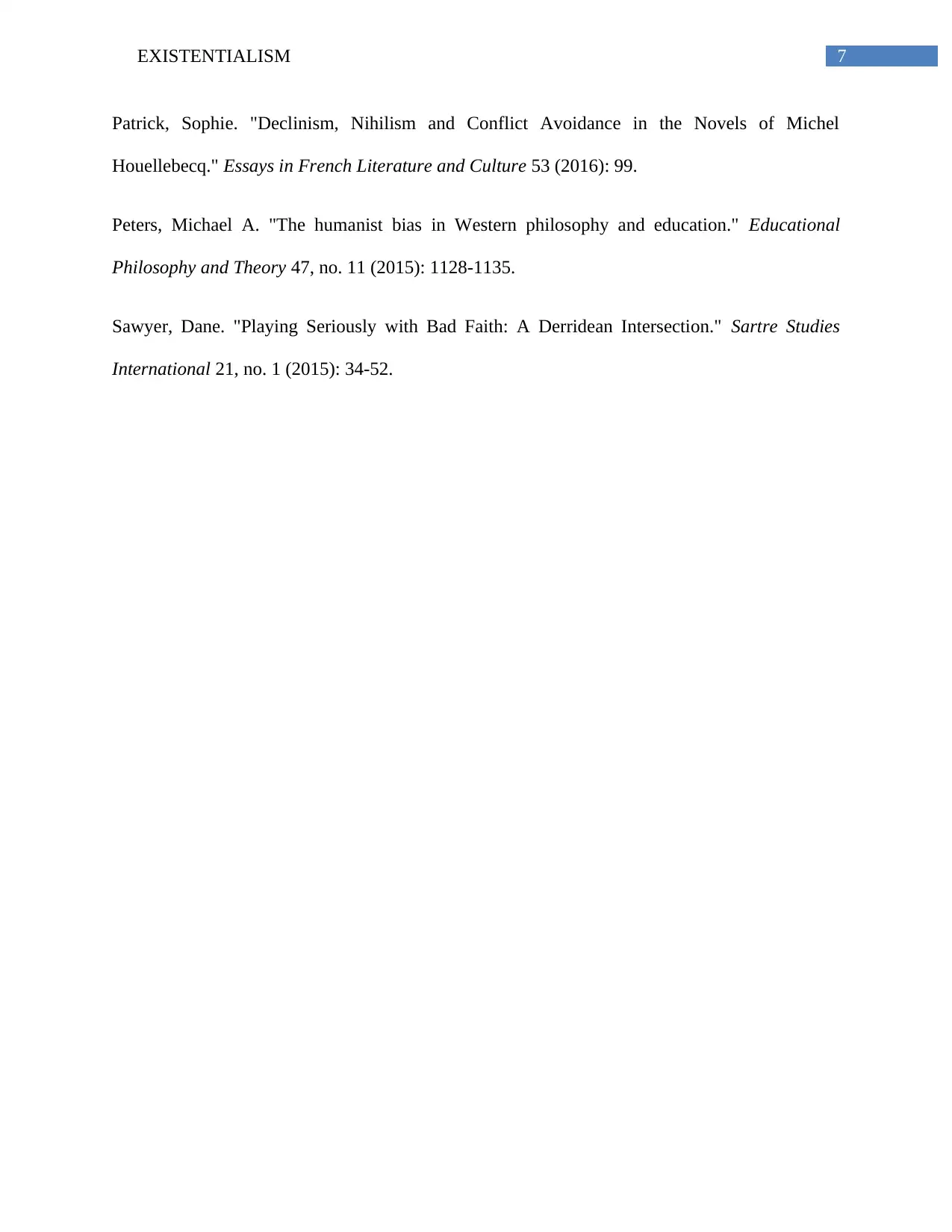
7EXISTENTIALISM
Patrick, Sophie. "Declinism, Nihilism and Conflict Avoidance in the Novels of Michel
Houellebecq." Essays in French Literature and Culture 53 (2016): 99.
Peters, Michael A. "The humanist bias in Western philosophy and education." Educational
Philosophy and Theory 47, no. 11 (2015): 1128-1135.
Sawyer, Dane. "Playing Seriously with Bad Faith: A Derridean Intersection." Sartre Studies
International 21, no. 1 (2015): 34-52.
Patrick, Sophie. "Declinism, Nihilism and Conflict Avoidance in the Novels of Michel
Houellebecq." Essays in French Literature and Culture 53 (2016): 99.
Peters, Michael A. "The humanist bias in Western philosophy and education." Educational
Philosophy and Theory 47, no. 11 (2015): 1128-1135.
Sawyer, Dane. "Playing Seriously with Bad Faith: A Derridean Intersection." Sartre Studies
International 21, no. 1 (2015): 34-52.

8EXISTENTIALISM
⊘ This is a preview!⊘
Do you want full access?
Subscribe today to unlock all pages.

Trusted by 1+ million students worldwide
1 out of 9
Related Documents
Your All-in-One AI-Powered Toolkit for Academic Success.
+13062052269
info@desklib.com
Available 24*7 on WhatsApp / Email
![[object Object]](/_next/static/media/star-bottom.7253800d.svg)
Unlock your academic potential
Copyright © 2020–2026 A2Z Services. All Rights Reserved. Developed and managed by ZUCOL.



![Origin Stories and Destiny: Religious Studies at [University Name]](/_next/image/?url=https%3A%2F%2Fdesklib.com%2Fmedia%2Forigin-stories-destiny-theology_page_1.jpg&w=256&q=75)

